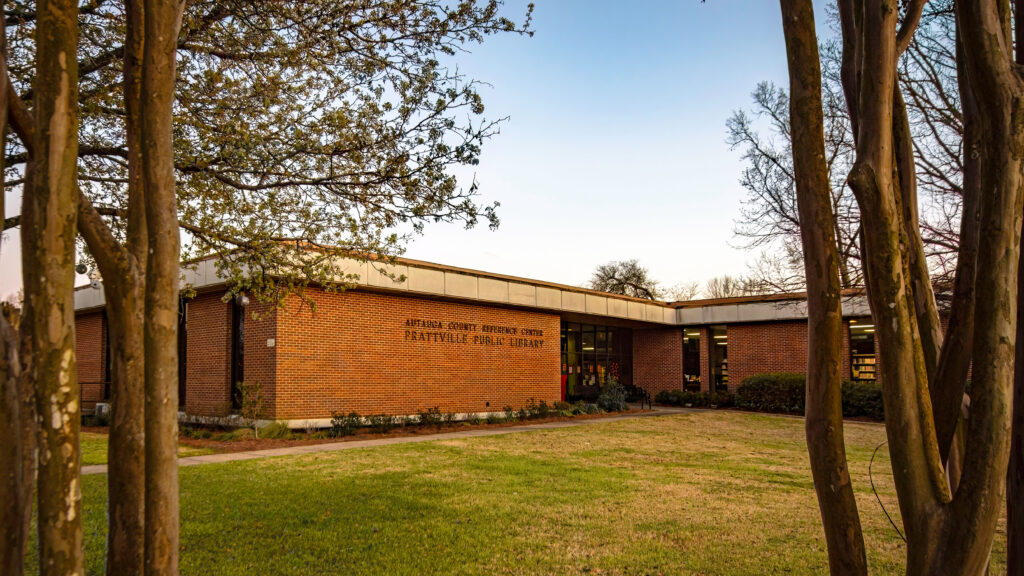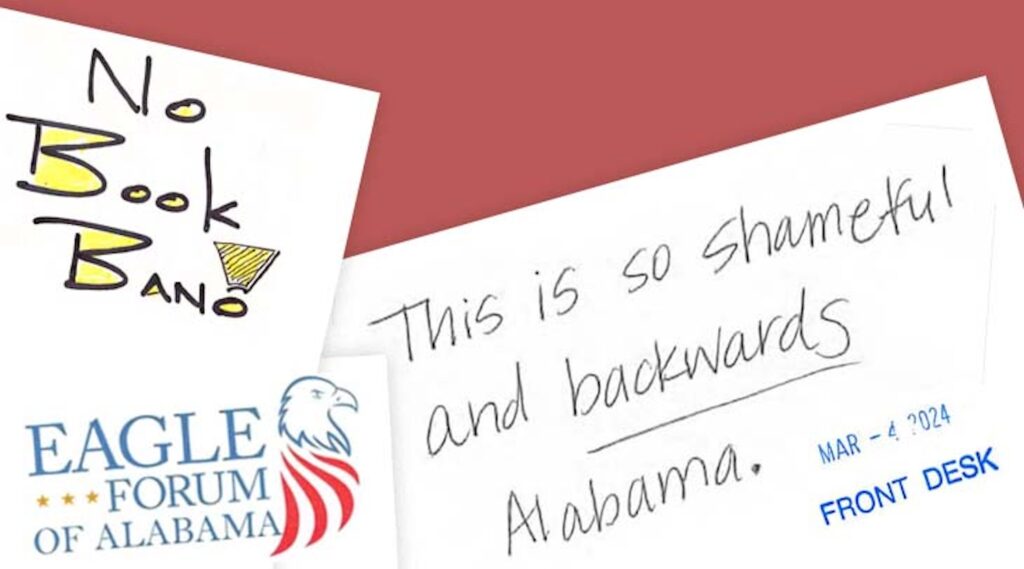|
Getting your Trinity Audio player ready...
|
Another year is in the history books, and one of my top stories of last year became even bigger in 2024 with chaos at the Autuaga-Prattville Public Library. The statewide challenges to libraries also heated up, and Prattville got caught up in the news again when Mayor Bill Gillespie attempted to deny an LGBTQ+ group’s float in the city Christmas parade. I also took a look into Alabama’s underground market for raw milk and a manufactured outrage about a supposed immigrant crisis in Albertville.

The Autauga-Prattville Public Library became the primary battleground in the culture war over library books in 2024 (Jackie Nix/Adobe Stock)
Prattville library becomes testing ground for policy battle
A year-long battle over control over the Autauga-Prattville Public Library reached new heights in 2024 as the Autauga County Commission stacked the board with new members sympathetic to the calls of Clean Up Alabama and like-minded residents.
It took barely over a month for the new members—Ray Boles, Rachel Daniels, Doug Darr, Logan Strock, Gloria Kuykendall and Quincy Minor—to rewrite the library’s policy to exclude LGBTQ+ content from being accessible to minors. At the same meeting, the board hired attorney Laura Clark, whose law firm had previously made clear its desire to sue the previous board over inclusion of the books.
Soon, the APPL board bylaws and policy committee began instructing director Andrew Foster to move or remove a list of books that were largely selected based on LGBTQ+ content, including several books the previous board had ruled as appropriately shelved.
APR discovered the list through an open records request answered by Foster. The board soon called a special meeting to fire Foster, saying he released confidential information and violated criminal law. Foster’s abrupt firing led library employees to lock the doors during operating hours, and when they refused to cooperate with Boles’ order to reopen, four employees were fired.
The following day, the APPL board called a “special meeting” less than 24 hours in advance to hire a new interim director. This violated Alabama’s Open Meetings Act, which requires 24-hour advance notice of a special meeting.
Clark soon sent an email to APR editor Bill Britt demanding a retraction, claiming the meeting was an “emergency meeting,” which only requires one-hour notice under open meetings law.
Sources within the library and a recording of a meeting between Boles and staff, however, contradicted that retraction demand. Boles then went on a right-wing radio show to talk about the controversy, and revealed new details that led to new contradictions.Foster, meanwhile, shared his story on CNN.
Foster soon demanded retractions of his own from Clark and Boles, and demanded reinstatement by the library board. He threatened to sue Clark and Boles for defamation, and the library board for violation of the Open Meetings Act on at least four different counts rated to his own termination meeting and the meeting hiring Bear.
He eventually did sue the library board, with the board hiring another attorney, Bryan Taylor, to handle the suit. The board ultimately reached a confidential settlement with Foster. APR later revealed through a public records request that the board agreed to pay Foster $20,000 in exchange for him to settle the suit and agree not to bring action against Boles or Clark.
The library didn’t just fire Foster for talking to the press; it later fired assistant director Kaitlin Wilson apparently for talking to APR for an article detailing how many employees were working and how stretched they would be for hours between four locations. APR had no need to glean information from Wilson for that article, as all of the information is easily ascertainable public record.
Read Freely Alabama, the Alabama Library Association and individual patrons of the library filed a federal lawsuit in March challenging the board’s new policies. The lawsuit made national news, featured on MSCNBC.
The board hired Bryan Taylor again to represent them in this lawsuit, and he advised them to change their policies. The board approved new policies in June that no longer directly prohibited the inclusion of LGBTQ books, while still providing a pathway to keep those books out of the library.
The plaintiffs say the new policies do nothing to provide them relief, and have moved for the court to offer a preliminary injunction. The library board has challenged that motion, arguing that the curation of library books is government speech. The last action in that lawsuit came on Oct. 1 and both sides are awaiting a ruling from U.S. District Judge Myron Thompson on the matter.
The Prattville City Council last week cemented the stacking of the library board by reappointing Darr and appointing a new member, Don Bethel, that one fired librarian revealed had submitted multiple book challenges.

Citizens await the annual Christmas tree lighting in Prattville. (Jacob Holmes/APR)
Prattville LGBTQ+ group fights to keep place in Christmas parade
Prattville Pride filed the very first request in 2024 to be in the Prattville Christmas parade and were granted admission just like any other group. But the group’s inclusion led to an uproar after being highlighted by a far-right media site and gaining traction with opposition from Clean Up Alabama.
At its Tuesday council meeting just days before the parade, the city’s attorney Andrew Odom warned the council that denying the group’s right to participate in the parade would be a “prior restraint” on speech and land the city in legal trouble.
Two days later, though, Mayor Bill Gillespie announced the group would not be allowed to participate in the parade due to “safety concerns.”
By the close of that business day, Prattville Pride indeed filed suit, claiming that the city had infringed upon its First and Fourteenth Amendment rights. They served the mayor during the city’s annual tree lighting ceremony.
The following afternoon, a federal judge ruled that the city must allow the group to participate in the parade and honor the group’s request for two police officers to escort the float.
The group ultimately participated in the parade with very little negative response from the crowd in attendance, although one man threw a water balloon at the float and narrowly missed soaking a child in near-freezing temperatures.

A graphic shows real text and logos from letters submitted to the Alabama Public Library Service during a 90-day public comment session on administrative code changes.
Legislature, APLS respond to library attacks
While the attacks on libraries started at the local levels, in 2024 both the Alabama Legislature and the Alabama Public Library Service began taking action on the matter.
Most notably, State Rep. Arnold Mooney, R-Indian Springs, repurposed his bill from the prior year intending to ban drag shows in public spaces to extend to library materials. The bill would have also repealed the exemption that exists to keep librarians from being criminally charged for books on library shelves.
The bill failed to pass out of the Legislature, but Mooney has already filed the bill again as HB4, with a new process defined for citizens to challenge books. A total of 50 House Republicans sponsor the bill, assuring a quick passage out of the House and on to the Senate.
Groups also fought over changes to state aid requirements in the APLS administrative code, spurred by Ivey in late 2023. Ivey had called for minor changes relative to the code changes that were eventually adopted. While Ivey’s changes were already in process, Clean Up Alabama criticized Ivey’s proposal as “falling short” and the group’s counterproposal laid the template for an amendment to the code changes later pushed through by ALGOP Chair John Wahl and Ivey’s two most recent APLS appointments: Amy Minton and Debbie Windsor.
During the public comment section on the APLS code changes, the two sides were split fairly evenly, with a slim 50.2 percent majority calling for the changes proposed by Clean Up Alabama and Eagle Forum. Letters opposed to the changes in some way comprised 45.5 percent of the comments.
Even before the APLS could mint its new code changes, House Education Chair Danny Garrett, R-Trussville, wrote into the budget that libraries hoping to receive state aid would have to conform with Ivey’s suggested policies. He also proposed an 18 percent cut to the APLS administrative budget, which the Senate later reduced to a 9 percent budget cut.
Despite some criticism from groups who say Wahl has a conflict of interest as chair of ALGOP and an APLS board member, the board voted narrowly to make Wahl the new chair of the executive board in September.
The new code requirements have led to different implementations in library systems across the state. The Huntsville-Madison County Public Library system is moving PG Disney movies to the young adult section, the Cullman library completely eliminated its young adult section, the Fairhope Public Library has faced backlash for keeping two books on the shelves despite policy changes.

A thumbnail for a video produced by Reason Magazine draws a comparison between the raw milk trade and bootlegging by parodying the classic George Jones song “White Lightning.” (REASON TV)
Alabama’s raw milk market
Raw milk became a trending topic in the U.S. shortly after the reelection of Donald Trump as he named Robert F. Kennedy Jr. as his pick to lead the Department of Health and Human Services. RFK has publicly stated his support for deregulating raw milk.
So I looked into Alabama’s raw milk market for myself and was met with a sort of underground system where sellers label the product as only for pet consumption, despite both sellers and customers clearly understanding that the real market for the product is for human consumption.
Despite health experts debunking the numerous claims surrounding raw milk, individual consumers of the product in the state shared their anecdotal stories of what they believe are benefits of consuming raw milk.

The Russellville Pilgrim’s Pride plant recently expanded, necessitating buses to transport workers from Albertville and surrounding areas.
Manufactured outrage over Albertville immigrants
The arrival of charter buses in Albertville led to a cascade of social media fervor that spilled over into city meetings about misconceptions that the buses were dropping off thousands of immigrants in the city. It turned out that those buses were not actually bringing new immigrants to Albertville; they were taking them away to work at the Pilgrim Pride’s expanded poultry plant in Russellville, and then bringing them back home after their shifts. Despite the rumors being unsubstantiated, lawmakers piled on, including Albertville’s State Rep. Brock Colvin openly wondering “how many (literal cannibal gangs) have slipped through and made their way to my hometown?” There is no evidence of Haitian immigrants eating dogs, cats or geese—much less people—in Albertville.















































